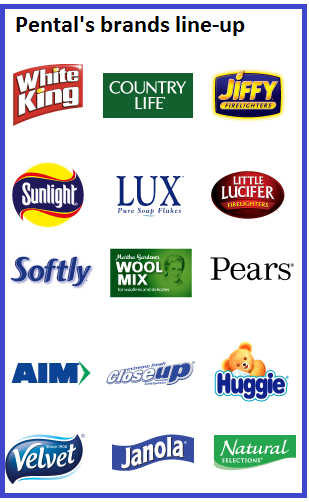Pental cleans up
Pental (PTL) has successfully restructured its business to be back in favour with its supermarket chain customers after only just surviving a crippling combination of operating conditions in 2012.
The household cleaning and personal care business owns and manufactures some of Australia’s most well-known supermarket brands – White King, Country Life, Softly, Aim, Jiffy, Little Lucifer & Velvet. The company also has a smaller presence in New Zealand.
Established in 1954, the company is the largest manufacturer of soaps in Australia. It was acquired by Symex in 2003 and changed its name to Pental as part of the restructure in early 2013.
New CEO Charlie McLeish has spent 30 years in the fast moving consumer goods (FMCG) industry, and has a strong track record of turnarounds and operational improvements. His early efforts in driving new product initiatives and branding have been well received given the high take-up rates of new products.
As more evidence of the turnaround becomes evident at the half-year result, I believe the stock will be re-rated as the market looks forward to the next few years of earnings growth.
With FY14 being a year of stabilisation, I am expecting flat revenue and earnings before interest tax, depreciation and amortisation (EBITDA). The reduced debt position will save approximately $3 million in interest costs, and nearly double net profit from last year! There will be further savings in FY15, with net debt virtually non-existent.
With a new less restrictive banking relationship just around the corner the dividend policy will also be re-instated. A large franking account balance will ensure fully franked dividends.
Trading on a FY15 PE of 7.6, I have an outperform recommendation on the company with a price target of 4.6 cents.
| Pental (PTL) at a Glance | FY13 | |
| Share Price | $ | 0.029 |
| PE | x | 11.6 |
| EV/EBITDA | x | 6.8 |
| market cap | $m | 52 |
| Dividend Yield | % | - |
| Gearing (debt/equity) | % | 13 |
| Target Price | $ | 0.046 |
Near fatal disaster
In 2013 management closed operations at its Port Melbourne site, which manufactured oleo chemicals (chemicals derived from plant and animal fats) – the core ingredients in many consumer staple products and food items. This business became loss making in FY12 due to its input product “tallow” being priced well above competitor products. This combined with weak end markets in Asia and Europe and a high Australian dollar.
Earnings had been highly cyclical with unpredictable operating conditions, although ultimately a decision was made to close the division with the view that operating conditions would not improve in the short term.
The weakness in the chemical business occurred at the worst possible time. The company’s debt levels were well above normal due to the $50 million debt funded “White King” and “Janola” brand acquisitions in 2011. Simultaneously, the consumer goods business was under stress from the large supermarket chains (Coles and Woolworths) reducing shelf prices to win market share, and also cutting the amount of branded products on their shelves.
During the year the company suffered from the deletion of some key products (including Huggies and Sunlight) due to competitive pressure and because the cost to maintain shelf space would have resulted in an operating loss for those products.
In a near fatal disaster the news flow continued to decline throughout 2012, with the resignation of the CEO Greg Tremewen in March, a $59 million impairment write-down, and an FY12 operating loss. The most damaging blow, however, was the hugely dilutive equity raising, forced upon management by the company’s lenders.
FMCG environment
While the company is now financially secure and set for growth, the difficult conditions of the FMCG industry can’t be understated. The pricing war between the supermarket chains to gain market share continues, with second-tier suppliers struggling due to the increased presence of private label across the categories.
Luckily for Pental, it is the category leader for many of its products. White King is the most dominant, with 80% of the retail bleach market.
The Australian Competition and Consumer Commission has a long list of concerns regarding the potential abuse of power between Coles/Woolworths and their suppliers. These include forced supplier funded promotions, compulsory fee increases to maintain shelf space, or product delistings without warning.
In November last year Coles and Woolworths voluntarily signed a code of conduct with the Australian Food and Grocery Council in relation to their relationships with suppliers. This was certainly a step forward in the debate on the major chains’ alleged abuse of market power. However it remains to be seen if this was just a tactic to delay more stringent government driven regulation. Significantly, none of the other supermarket retailers signed the code, providing the sceptics with plenty of reason for doubt.
Coles and Woolworths currently have a combined market share of approximately 70%. Anything that can be done to reduce this share and make the supermarket environment more competitive will be a positive for Pental.
While Coles and Woolworths will always be the major customers, positive relationships have been formed with the newer entrants and there are also some opportunities to expand into new sales channels. Contracts are in place to develop private label volumes for Aldi, supply branded products to Costco, and Metcash also has been supportive of many of its new product initiatives. The new channel agreements are with Mitre 10, the Reject Shop, and management is also targeting the hardware chain Masters.
As well as alternate sales channels, management’s response to this FMCG environment is to increasingly look to participate in private label manufacturing itself, and to ensure it doesn’t participate in any non-profitable supplier funded promotions, or products that don’t enable acceptable margins.
The reason management is happy to manufacture private label against its own product is because it supports manufacturing volumes and enables the control of the shelf category in regards to both price and product mix.
Recovery path
Tremewen’s replacement CEO, Alan Fisher, then led a strategic rebuild initially focused on debt reduction. With the chemicals division to be closed, the company placed all its focus on regaining credibility in the FMCG business.
The group’s bleach plant was relocated to Shepparton, allowing all operations to be on the one site. The added bonus of this is that the company’s Enterprise Bargaining Agreement is much more favourable at its Shepparton site, where the equivalent of five days work at the old site can be completed in three.
The restructure has been successful, with debt reduced from $70 million to $14 million by June 2013, thanks to cost cutting, the sale of Port Melbourne, and the sale and leaseback of the Shepparton site. Net debt is currently about $5.5 million.
Whilst Fisher completed a successful restructure benefiting from his experience in turnarounds, the baton was handed over to McLeish from the beginning of 2014 to further drive operational gains and get the company back on a growth path. McLeish started with Pental in an operational role in March 2012 and hence was able to hit the ground running as CEO.
Early gains have included re-establishing relationships with the supermarket chains, driving product innovation, brand marketing and tendering for more private label contracts. There is a list of “profit delivery projects” or cost efficiency projects that have been identified – however, given the recent history, management is being conservative with capital and ensuring less than a three-year pay-back before initiating any of these projects.
Pental is now back on top of the list of suppliers that the supermarkets want to deal with. A large part of the company’s new branding strategy has been to reinforce its Australian made and owned status for all brands. In the last six to 12 months this has become a highly important focus for the large chains as they attempt to keep the federal government on side and prevent further action regarding competition issues and abuses of market power.
The improved competitive position of Australian manufacturers due to the lower Australian dollar is another reason for the chains to support local products. In categories such as soap, fabric softener and household cleaning many of Pental’s competitors have imported products and hence the potential of market share gains.
Promising outlook
Pental is well positioned to benefit from its hard work in restructuring. The new product pipeline will be presented and developed over the next 18 months, and the “profit delivery projects” will be major drivers of growth, as will the increased private label tenders. There is now capacity for increased manufacturing volumes due to the expansion of the Shepparton site.
Valuation note
With the company having completed a huge amount of work to ensure growth over the next 2-3 years, I see FY15 as the most relevant earnings year for a PE based price target. FY13 and FY14 earnings are also constrained by high interest costs. My 4.6 cent price target is based on a FY15 PE multiple of 12 – A discount to the consumer staples sector, reflecting the company’s lack of scale and also the near disaster in FY12.
Financial summary
Clearly the FY13 return on equity of 3.8% is not acceptable; however with the restructuring initiatives in place the company is on track to achieve an ROE of 11% within our forecast period.
Recently, at the extended exercise date which loyalty option holders had to exercise their options to qualify for “piggy back options”, $5.76 million was raised. As a result 287.8 million additional shares have been issued, increasing total shares outstanding to 1,792 million.
With the company back on track and positioning for growth, management is likely to lock in a more favourable banking relationship, freeing up the balance sheet and enabling the reinstatement of a dividend.
With debt and the balance sheet under control, another target over the next one to two years will be a share consolidation considering the massive number of shares on issue.
For further information on Pental’s financial statistics, click here.
















